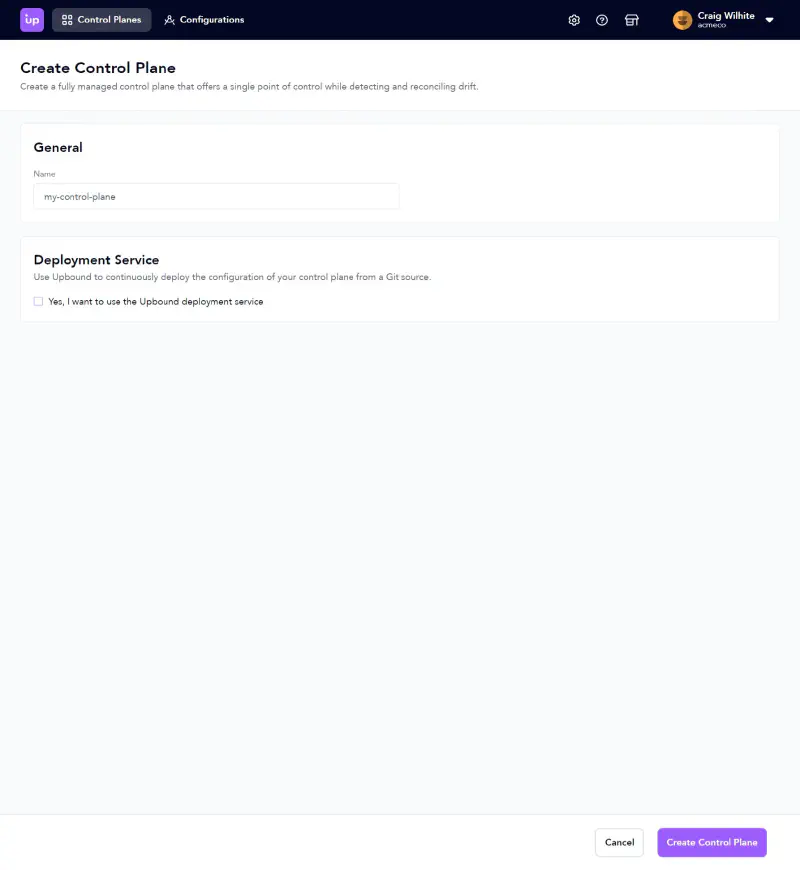In this tutorial, you learn how to create a control plane in Upbound and connect it to Argo CD. Argo CD is a continuous delivery tool for Kubernetes that you can use to deliver configurations to control planes in Upbound.
Prerequisites
To complete this tutorial, you need the following:
- Have already deployed an instance of Argo CD on a Kubernetes cluster (or using a hosted service such as Akuity).
- The up CLI on your local machine.
Create a control plane
Create a new control plane inside your Upbound account.
Run the following command in a terminal:
up ctp create my-control-plane
Fetch the control plane’s connection details
To add the control plane as a target context in Argo, you need its connection details. You need to generate a kubeconfig for your control plane.
Create a personal access token
You need a personal access token (PAT) to generate a kubeconfig. You create PATs on a per-user basis in the Upbound Console. Go to My Account - API tokens and select Create New Token. Give the token a name and save the secret value to somewhere safe.
Generate a kubeconfig
Run the following command in a terminal:
export UPBOUND_MCP_PATH=""
export UPBOUND_CTP_KUBECONFIG=""
up ctx "${UPBOUND_MCP_PATH}" -f "${UPBOUND_CTP_KUBECONFIG}"
This command saves the kubeconfig for the control plane to a file in your working directory.
Add the control plane as a context to Argo
Switch contexts to the Kubernetes cluster where you’ve installed Argo. Create a secret on the Argo cluster whose data contains the connection details fetched from the previous step.
Run the following command in a terminal:
cat <<EOF | kubectl apply -f -
apiVersion: v1
kind: Secret
metadata:
name: my-control-plane
namespace: argocd
labels:
argocd.argoproj.io/secret-type: cluster
type: Opaque
stringData:
name: my-control-plane-context
server: https://<space-name>.space.mxe.upbound.io/apis/spaces.upbound.io/v1beta1/namespaces/<group>/controlplanes/clusters/k8s
config: |
{
"bearerToken": "${UPBOUND_API_TOKEN}",
"tlsClientConfig": {
"insecure": true
}
}
EOF
Create an Argo Application
Use the Argo CD Application resource to represent a Git repository that contains Crossplane configuration objects you want deployed on your control plane.
Keeping your context pointed at the Argo cluster, run the following command in a terminal:
cat <<EOF | kubectl apply -f -
apiVersion: argoproj.io/v1alpha1
kind: Application
metadata:
name: control-plane-config
namespace: argocd
spec:
project: default
source:
repoURL: https://github.com/upbound/mcp-config-argo.git
targetRevision: HEAD
path: configuration
destination:
name: my-control-plane-context
EOF
This application points at a sample repository that contains a reference Crossplane configuration.
Inspect the configuration of your control plane
Once synced, Argo installs the configuration on your control plane in Upbound. You can confirm this by switching your kubeconfig context back to your control plane. Then run the following command in a terminal:
kubectl get configuration
# The output should look like this:
NAME INSTALLED HEALTHY PACKAGE AGE
platform-ref-aws True True xpkg.upbound.io/upbound/platform-ref-aws:v0.9.0 2m51s
upbound-configuration-app True True xpkg.upbound.io/upbound/configuration-app:v0.2.0 2m43s
upbound-configuration-aws-database True True xpkg.upbound.io/upbound/configuration-aws-database:v0.5.0 2m47s
upbound-configuration-aws-eks True True xpkg.upbound.io/upbound/configuration-aws-eks:v0.5.0 2m45s
upbound-configuration-aws-network True True xpkg.upbound.io/upbound/configuration-aws-network:v0.7.0 2m49s
upbound-configuration-gitops-flux True True xpkg.upbound.io/upbound/configuration-gitops-flux:v0.2.0 2m40s
upbound-configuration-observability-oss True True xpkg.upbound.io/upbound/configuration-observability-oss:v0.2.0 2m42s
